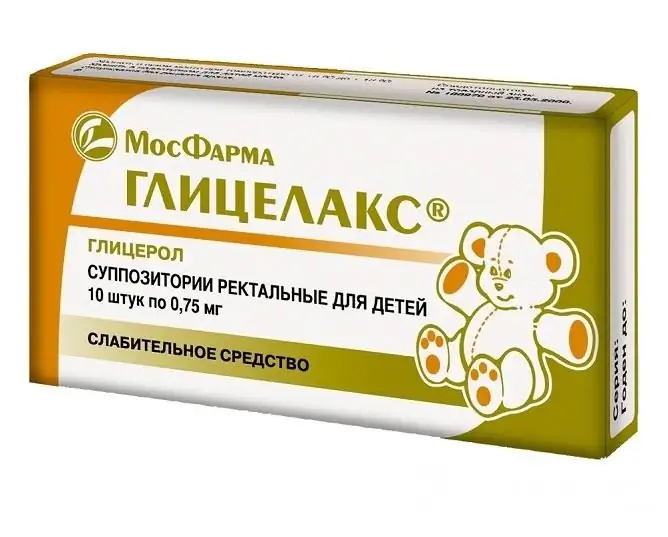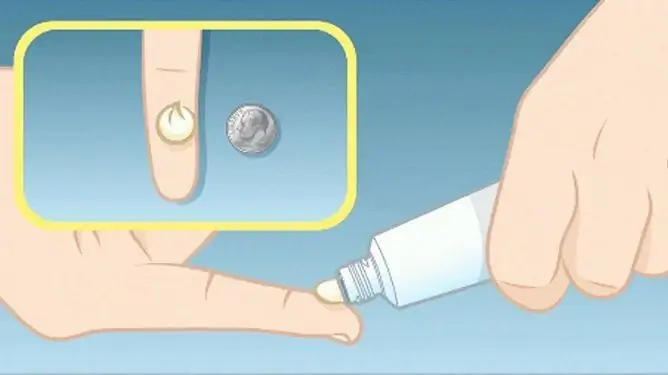- Author Rachel Wainwright wainwright@abchealthonline.com.
- Public 2024-01-15 19:51.
- Last modified 2025-11-02 20:14.
Children's candles for constipation
The content of the article:
- Suppositories for constipation for children up to a year
-
Types of suppositories used in pediatric practice
- Glycerin suppositories
- Sea buckthorn candles for children
- How to use rectal suppositories correctly
- What else can you do if a baby has a delay in bowel movement?
- Overview of delayed bowel movements in young children
- Video
Children's suppositories for constipation work quickly and effectively, but are usually not the only treatment.
Do not self-medicate for constipation in young children. It is important to remember that the uncontrolled use of medicines (including rectal suppositories) can hide the signs of serious illness. With frequent constipation in a baby, you should definitely consult a doctor who will conduct an examination and prescribe treatment aimed at eliminating the cause.

Children's glycerin-containing suppositories are an effective and generally safe remedy for constipation, but their use requires consultation with a doctor
Delayed bowel movements can develop in patients of various age groups, including young children. For problems with bowel movement, babies may be prescribed drugs in the form of a syrup, but rectal suppositories are the preferred form. Rectal suppositories work faster than oral medications. They are safe to use, do not cause dehydration of the body, and are suitable for use in the postoperative period.
Suppositories for constipation for children up to a year
Fast-acting rectal suppositories are especially convenient for treating young children, in addition, they are among the safest medicines, therefore (strictly with the permission of the pediatrician) it is permissible to use suppositories for constipation for newborns from the first days of life.
Even the safest remedy has its pros and cons, and children's suppositories also have them:
| pros | Minuses |
| Effective | Do not affect the cause of the pathology |
| Safe | Can be prescribed for a short period of time, for chronic constipation - until the cause is clarified |
| Helps in case of accumulation of feces in the lower intestines (rectum and sigmoid colon) | If delayed bowel movements are caused by tumors, hernias, spasms, and fecal masses accumulate in the upper intestines, rectal suppositories are not used |
| Ease of use, painless administration, the ability to use at home | With frequent and uncontrolled use, the patient's natural urge to defecate is weakened, and this can also lead to losses of calcium, protein, disruption of the intestinal microflora, irritation in the anus, the appearance of skin rashes and itching |
Types of suppositories used in pediatric practice
Children under the age of one year, after consulting a doctor, can use glycerin or sea buckthorn candles.
For the treatment of children 2-3 years of age and older, you can also use gas-forming suppositories (carbon dioxide irritates the intestinal wall and stimulates the evacuation of feces).
Glycerin suppositories
Rectal suppositories based on glycerin (glycerol) help well with delayed bowel movements in babies. This group includes Glycerin, Glycelax.
They have the following properties:
- The active substance is not absorbed through the rectal mucosa, but acts locally.
- The irritating effect leads to increased intestinal peristalsis and promotes the movement of feces.
- Softens feces.
- Reduces gassing.
- They dissolve quickly in the intestines. The remains are excreted along with the feces.
Glycerin suppositories are usually prescribed for babies from 3 months of age. When using suppositories to treat patients of any age, a doctor's consultation is required.
Glycerin suppositories can be used once a day, usually in the morning about 20 minutes after feeding. The effect occurs 5-20 minutes after the introduction of the suppository into the anus.
Contraindications to the use of children's candles for constipation can be:
- individual intolerance to the components of the drug;
- inflammatory processes in the rectum;
- hemorrhoids;
- fissure of the rectum;
- intestinal neoplasms;
- renal failure;
- gastrointestinal bleeding.
The most common side effects of glycerin suppositories are the intestinal habituation to external stimulation. In rare cases, patients develop an allergic reaction to the components of the drug, which may manifest as itching and / or burning at the site of action.
Sea buckthorn candles for children
Sea buckthorn suppositories are not directly laxative, but they are able to soften dense feces, have anti-inflammatory and healing effects. They are used in the treatment of constipation, especially against the background of inflammation in the lower intestines.
This type of rectal suppository is prescribed for patients 6 months of age and older. The action of sea buckthorn rectal suppositories begins approximately 30 minutes after administration, usually 1 suppository per day is used to treat children. Contraindications to the use of the drug are individual intolerance and the presence of open wounds in the anus.
How to use rectal suppositories correctly
- Rectal suppositories should be stored cool to maintain their shape and effectiveness. However, the suppository used should not be too cold; it should be slightly warmed in the hands before use.
- Before setting the suppository, the adult performing the manipulation should thoroughly wash his hands with warm water and soap.
- The patient's perianal skin should be cleaned (eg with sterile oil).
- The suppository is injected with a narrowed edge into the rectum to a depth of about 2.5 cm, after which it is recommended to lay the child on his stomach and close his buttocks with your hands so that the drug does not fall out.
- After a bowel movement, the skin around the baby's anus should be thoroughly cleaned.
- If the expected effect is absent, do not increase the dosage and / or frequency of use of the drug.
What else can you do if a baby has a delay in bowel movement?
Medical therapy for delayed bowel movements in infants can be difficult due to the fact that not all drugs can be used to treat children of this age. Prescribed drugs should be used only in the dosage indicated by the attending physician, before using the drugs, you must carefully read the instructions for use.
Other methods:
| Method | Description |
| Microclysters |
Can be used for delayed bowel movements in babies from birth. The effect occurs within 5 minutes after setting the micro enema. They help to soften hard feces and remove them from the body. A contraindication to use is severe inflammation in the anus. Before setting microclysters, its tip can be lubricated with warm vegetable oil, after which, after laying the child on the stomach, the tip is inserted into the rectum up to the mark on it. Then the contents of the tube are squeezed out, the child is left to lie on his stomach for several minutes. |
| Massage | When constipation occurs in infants, a light massage of the abdomen, which consists in circular strokes in a clockwise direction, helps well. |
| Gymnastics, warm baths | They contribute to the improvement of metabolic processes due to the activation of blood circulation, have a general strengthening effect. |
| Nutrition correction | With constipation in infants, attention is paid to the mother's nutrition and her diet is adjusted. If a child has switched to artificial feeding, fermented milk products can be added to his diet, while it should be remembered that old kefir (3 days or more) can have a fixing effect, so it should not be given. |

Microclysters, in particular, Microlax, have an effect similar to that of glycerin suppositories.
Overview of delayed bowel movements in young children
In children of the first year of life, bowel movements, as a rule, occur daily. In the absence of a chair during the day, they speak of constipation.
The following factors can cause a delay in defecation in such a baby:
- Change in nutrition. The pathological process can develop in children who were breastfed, with the introduction of complementary foods into the diet or with a full transfer to artificial feeding. However, it may take some time for the child's body to adapt to the new food.
- Lack of mobility.
- The use of iron preparations. Because of them, the stool will become denser, and the child will become constipated.
- Infectious diseases, bowel diseases, congenital malformations.
In older patients, the cause of constipation can be malnutrition, physical overload, stressful situations, insufficient fluid intake, a sedentary lifestyle, and diseases of the gastrointestinal tract.
Video
We offer for viewing a video on the topic of the article.

Anna Aksenova Medical journalist About the author
Education: 2004-2007 "First Kiev Medical College" specialty "Laboratory Diagnostics".
Found a mistake in the text? Select it and press Ctrl + Enter.






